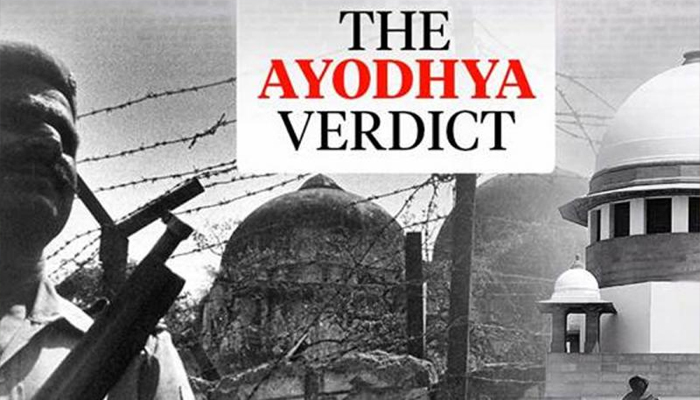TRENDING TAGS :
Timeline of Ram Janmabhoomi-Babri Masjid land dispute case
The Supreme Court on Saturday for Ram Janmabhoomi-Babri Masjid land dispute case granted entire 2.77 acre of disputed land in Ayodhya to deity Ram Lalla. Here is the chronology of the events in the dispute.
Lucknow: The Supreme Court on Saturday for Ram Janmabhoomi-Babri Masjid land dispute case granted entire 2.77 acre of disputed land in Ayodhya to deity Ram Lalla. Here is the chronology of the events in the dispute.
ALSO READ: Jaishankar welcomes Serbia’s support on Kashmir issue
- 1528: Babri Masjid built by Mir Baqi, commander of Mughal emperor Babur.
-1853: First incident of communal violence between Hindus and Muslims was recorded.
-1859: A fence was built on the orders of British colonial administration, separating the places of worship for Muslims and Hindus.
- 1949: Hindus had allegedly placed idol of Lord Ram inside the Mosque, triggering massive protest by Muslims. A civil suit was filed from both the sides. The government proclaims the premises a disputed area and locks the gates.
- 1950: Gopal Simla Visharad files suit in Faizabad district court for rights to worship the idols of Ram Lalla.
- 1959: Nirmohi Akhara files suit seeking possession of the site.
- 1961: UP Sunni Central Waqf Board files suit for possession of the site.
-1984: Vishwa Hindu Parishad party (VHP) was formed to free the birth place of Lord Ram. VHP also planned to build a temple in his honour. The campaign was helmed by BJP veteran Lal Krishna Advani.
-1986: District judge passed an order to unlock the gates of Babri Mosque to allow Hindus to worship. A Babri Mosque Action Committee was formed by Muslims to protest the court’s order.
-1989: VHP laid the foundation stone of a Ram temple on land adjacent to the disputed mosque.
-1991: Change of government and BJP came to power in Uttar Pradesh.
ALSO READ: Bengal releases list comparing Ayushman Bharat with own health scheme
-2001: VHP pledged again to build Hindu temple at the site on the Babri demolition anniversary.
-Jan 2002: PM Atal Behari Vajpayee constituted an Ayodhya cell in his office and appointed a senior official, Shatrughna Singh to hold talks with Hindu and Muslim leaders.
-Feb 2002: VHP kept a deadline of March 15 to begin construction of Ram Temple. Hundreds of volunteers were gathered on the construction site. A train carrying Hindu activists from Ayodhya was attacked in Godhra in Gujarat, killing at least 58 people.
-Mar 2002: Gujarat observed communal riots after the train attack, killing between 1,000 to 2,000 people, mostly Muslims.
-Apr 2002: Three High Court judges begin hearings on determining who owns the religious site.
-Jan 2003: Archaeologists begin a court-ordered survey to find out whether a temple to Lord Ram existed on the site.
ALSO READ: PM Modi to inaugurate Kartarpur Corridor Checkpost today
-Aug 2003: Survey said that a temple do exists beneath the Mosque but Muslims refuted it. Vajpayee was committed to build Ram Mandir at the disputed land and openly announced it at the funeral of Hindu activist Ramchandra Das Paramhans.
-Sept 2003: A court rules that seven Hindu leaders should stand trial for inciting the destruction of the Babri Mosque, but no charges are brought against Advani, who was also at the site in 1992.
-Oct 2004: Advani says his party still has "unwavering" commitment to building a temple at Ayodhya.
-Nov 2004: A court in UP ruled to review an earlier order which exonerated Advani for his role in the demolition of the mosque.
-July 2005: Suspected Islamic militants attacked the disputed site, using a vehicle with explosives. Security forces gunned down five people they say are militants, and a sixth who was not immediately identified.
-June 2009: The Liberhan commission investigating events leading up to the mosque's demolition submits its report - 17 years after it began its inquiry.
-Nov 2009: There was uproar in parliament as the commission blamed leading politicians from the Hindu nationalist BJP for a role in the destruction of mosque.
ALSO READ:Arabian Sea sees 4 cyclones in a year, first time after 1902
-Sep 2010: Allahabad High Court rules that the site should be split, with the Muslim community getting control of a third, Hindus another third and the Nirmohi Akhara sect the remainder. Control of the main disputed section, where the mosque was torn down, is given to Hindus. A lawyer for the Muslim community said he will appeal.
-May 2011: Supreme Court suspends High Court ruling after Hindu and Muslim groups appeal against the 2010 verdict. The two judge bench of Supreme Court remarked that the HC verdict was surprising as no party wanted a split of the site.
-2014: In a landmark win, the BJP led by Narendra Modi storms to power at the Centre.
-2015: The VHP announces a nationwide drive to collect stones for the construction of the Ram Mandir. Six months later, in December, two trucks of stones arrive at the disputed site. Mahant Nritya Gopal Das claims there is a green signal from the Modi government that the temple will be built now. The Uttar Pradesh government led by Akhilesh Yadav says it will not allow the arrival of the stones in Ayodhya for the construction of the Ram Mandir.
-March 2017: The Supreme Court said charges against Advani and other leaders cannot be dropped in the 1992 Babri mosque demolition case and that the case may be revived.
-March 2017: The BJP storms to power in Uttar Pradesh with a massive victory.
-March 21, 2017: The Supreme Court says the matter is sensitive and should be settled out of court. It asks stakeholders to hold talks and find an amicable solution.
ALSO READ:Jaishankar welcomes Serbia’s support on Kashmir issue






